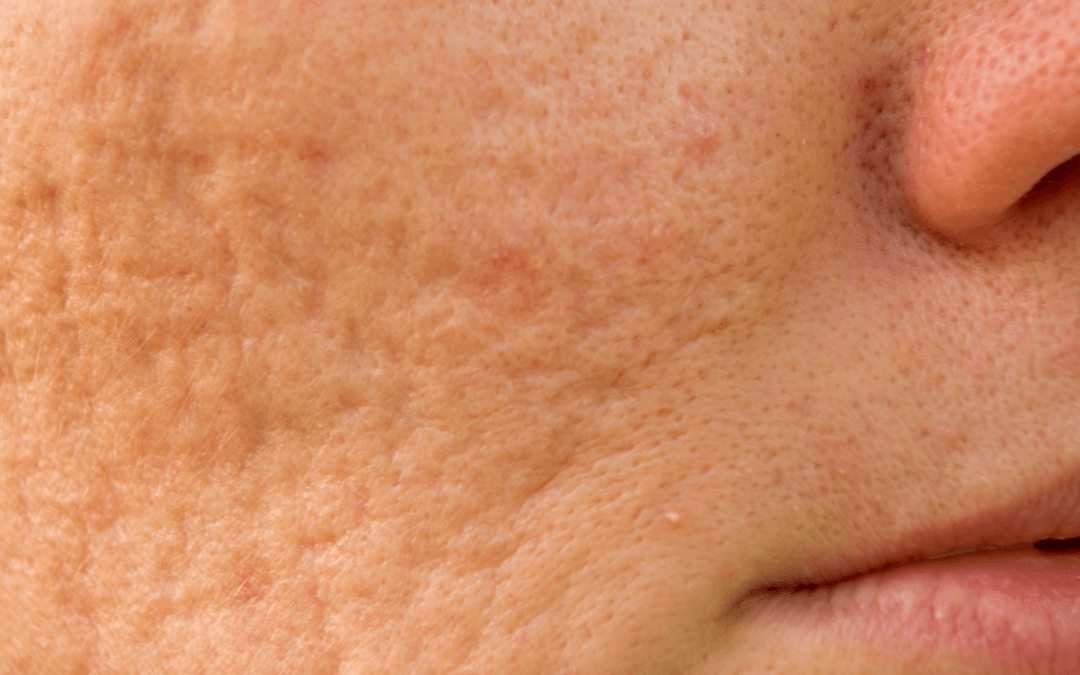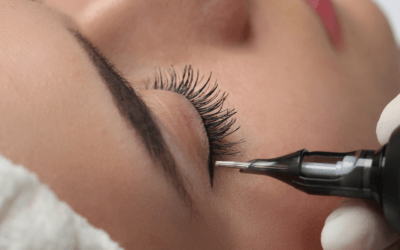Skin conditions like acne can be challenging to manage, not only because of the physical discomfort they cause, but also because of the psychological impact they can have on a person’s self-esteem. Acne scars, in particular, can be a source of embarrassment and shame for many people. In the Netflix documentary series, Skin Decisions Before After, you can follow the story of Sanaz, a young woman whose acne scars had been causing her distress for years.
Sanaz struggled with confidence-wrecking extreme acne since her teenage years. She explains that despite trying a variety of over-the-counter treatments, her skin had never fully cleared up. Over time, the acne had left behind pitted scars on her cheeks, which she found difficult to cover up with makeup. As a result, she often felt self-conscious and avoided social situations.
In the very first episode of the Skin Decisions: Before and After series, Sanaz meets with a dermatologist nurse Jamie and a plastic surgeon to explore her options for improving the appearance of her scars. After a thorough examination, they recommend a combination of treatments, including radio frequency, laser resurfacing, microneedling, ultherapy, plasma pen and dermal fillers.
Laser resurfacing is a procedure that uses a laser to remove the outer layers of skin, allowing new, healthy skin to grow in its place. It can be an effective treatment for acne scars, as it can help to even out the skin’s texture and reduce the appearance of pitting.
Microneedling, on the other hand, involves using a device with tiny needles to puncture the skin and stimulate the production of collagen, which can also help to improve the skin’s texture and reduce the appearance of scars.
In Sanaz’s case, the dermatologist also recommended the use of dermal fillers to help fill in some of the deeper scars on her cheeks. Dermal fillers are injectable substances that can add volume to the skin, smoothing out wrinkles and filling in depressions.
Nurse Jamie then uses ultherapy uses focused ultrasound that creates collagen and tightens skin. Plasma pen was used on Sanaz’ back scars. It causes the skin to contract and resurface.
Sanaz underwent a series of treatments over several weeks, and the results were remarkable. She was told that at best, she could expect a 60% improvement – and that perfection was simply unattainable in her case. (Not that perfection would exist, anyway – as she beautifully articulates it herself.) After the procedures, her acne scars were significantly less noticeable, and her skin looked smoother and more even, the texture of the skin was much softer, and her back showed major improvement. It had a profound impact on her confidence and self-esteem, allowing her to feel more comfortable and confident in social situations.
Sanaz’s story is a powerful reminder of the transformative power of medical treatments for skin conditions like acne scars. While it can be easy to feel helpless or discouraged in the face of stubborn skin problems, there are a wide variety of treatments available that can help to improve the appearance and health of the skin. By seeking out the guidance of qualified medical professionals and exploring different treatment options, it’s possible to achieve significant improvements in the appearance of even the most stubborn acne scars.
While we at Figaro London are not dermatologists and we don’t offer injectables, we do provide some of those non-invasive or minimally-invasive treatments you see in the documentary as well as some other treatments that can help people who suffer from acne scarring – thanks to Luwam, our resident Dermatologica-certified skin specialist.
Ultrasound Treatment: A Promising Solution for Acne Scarring
Ultrasound is a non-invasive medical procedure that uses high-frequency sound waves to penetrate deep into the skin. When used for the treatment of acne scars, ultrasound can help to stimulate collagen production, which can improve the appearance of scars by filling in depressions and evening out the skin’s texture.
During an ultrasound treatment for acne scars, a small hand-held device is moved over the skin, emitting high-frequency sound waves that penetrate into the deeper layers of the skin. These sound waves create a gentle heat that can stimulate the skin’s cells and increase blood flow, which can promote the production of collagen.
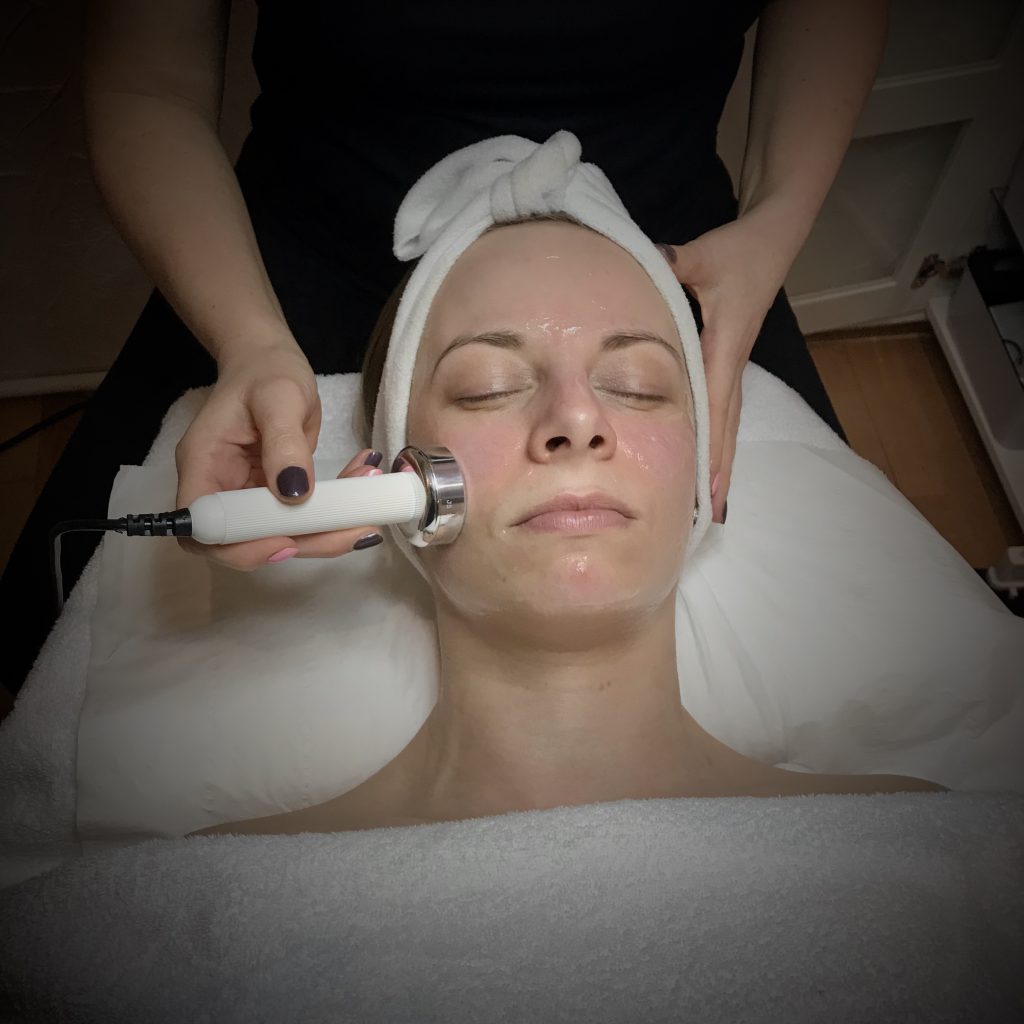
Ultrasound treatment
Collagen is a protein that is naturally present in the skin and is responsible for its structure and elasticity. When the skin is damaged, such as in the case of acne scarring, the body produces collagen to repair the damage. However, in some cases, the body may produce too little collagen or the collagen that is produced may be unevenly distributed, resulting in visible scars.
Ultrasound can help to stimulate the production of new collagen, which can help to fill in depressions and improve the texture of the skin. Over time, as the skin’s collagen levels increase, the appearance of acne scars can be significantly reduced.
One of the advantages of ultrasound for the treatment of acne scars is that it is non-invasive and does not require any downtime. Patients can resume their normal activities immediately after the treatment.
Microneedling: A Minimally Invasive Solution for Acne Scarring
Microneedling is a cosmetic procedure that involves the use of a small device with multiple fine needles that puncture the skin, creating microchannels in the skin’s surface. The procedure is also known as collagen induction therapy, as it stimulates the body’s natural collagen production, which can help to improve the appearance of acne scars.
When the skin is punctured during microneedling, it triggers a healing response, where the body produces new collagen and elastin fibres. These fibres help to fill in depressions in the skin caused by acne scarring, resulting in a smoother and more even skin texture. Additionally, microneedling can also improve the skin’s overall tone and texture by reducing the appearance of fine lines, wrinkles, and hyperpigmentation.
Microneedling is performed using a handheld device with a stamp with small needles as we see in the documentary as well. The needles penetrate the skin’s surface at different depths depending on the patient’s individual needs. The procedure is generally well-tolerated and does not require anaesthesia, although a topical numbing cream may be applied to minimise any discomfort.
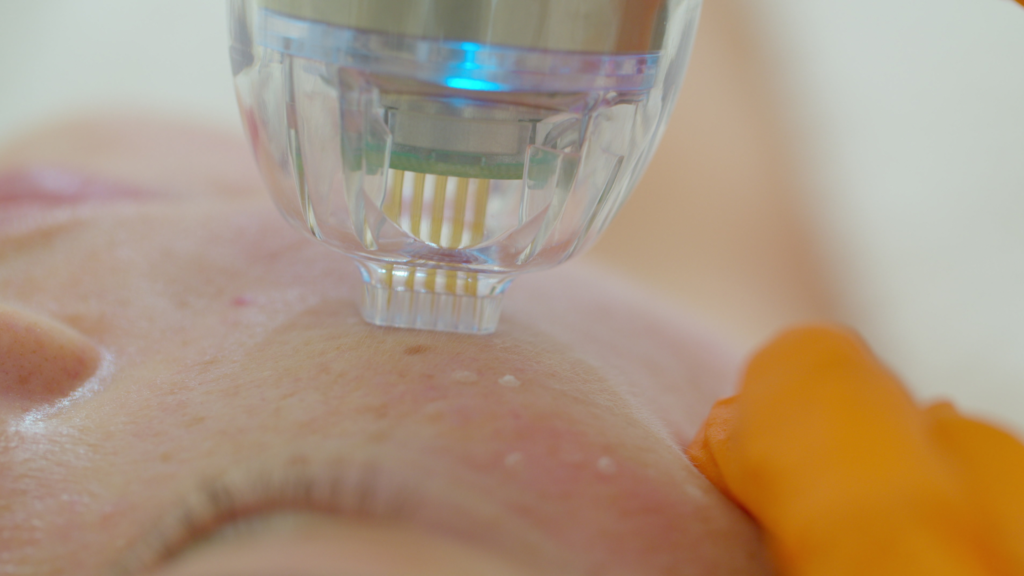
Microneedling in close-up: A small device with multiple fine needles that puncture the skin, creating micro-channels in the skin’s surface. It stimulates collagen production.
After the procedure, patients may experience some redness and mild swelling, which typically subsides within a day or two. The skin may also feel slightly sensitive and may peel or flake as the healing process takes place. It is important to avoid sun exposure and to use a gentle cleanser and moisturiser to promote healing and reduce the risk of infection.
Microneedling can be a safe and effective treatment option for improving the appearance of acne scars. It can be particularly useful for those with mild to moderate scarring, although it may require several treatments to achieve optimal results. As with any cosmetic procedure, it is important to consult with a qualified professional to determine if microneedling is appropriate and to develop an individualised treatment plan. With proper care and maintenance, microneedling can help to restore confidence and improve the overall appearance of the skin.
Radio Frequency: A Non-Invasive Solution for Acne Scarring
Radiofrequency (RF) is a non-invasive cosmetic procedure that uses energy waves to penetrate deep into the skin and stimulate collagen production. When used for the treatment of acne scars, RF can help to improve the skin’s texture and reduce the appearance of scarring.
During an RF treatment for acne scars, a device emits radiofrequency energy waves into the skin, creating heat that penetrates deep into the dermis. The heat stimulates collagen production, which can help to fill in depressions and improve the skin’s texture. RF can also help to tighten the skin and improve its elasticity, resulting in a more youthful and rejuvenated appearance.
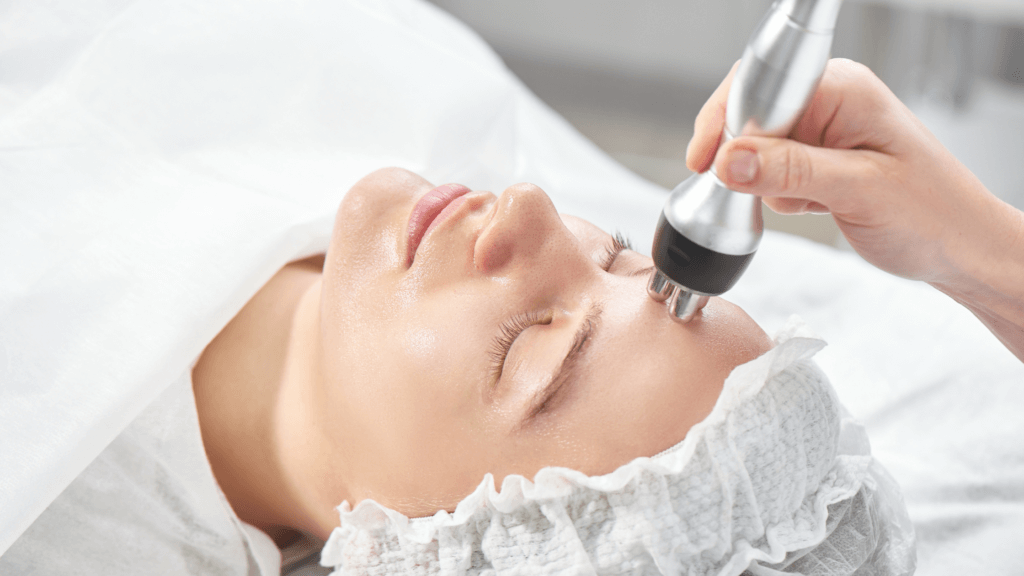
Radio frequency close up
The procedure is generally well-tolerated, and most patients report only a mild warming sensation during the treatment. After the procedure, patients may experience some mild redness or swelling, which typically subsides within a few hours.
RF can be a safe and effective treatment option for improving the appearance of acne scars. It can be particularly useful for those with mild to moderate scarring, although it may require several treatments to achieve optimal results. RF treatments are generally well-tolerated, and most patients can resume their normal activities immediately after the procedure.
Microdermabrasion: A Non-Invasive Exfoliating Solution for Acne Scarring
Microdermabrasion is a non-invasive cosmetic procedure that involves using a device with a small tip that uses fine crystals or a diamond tip to gently exfoliate the skin’s surface. When used for the treatment of acne scars, microdermabrasion can help to improve the skin’s texture and reduce the appearance of scarring.
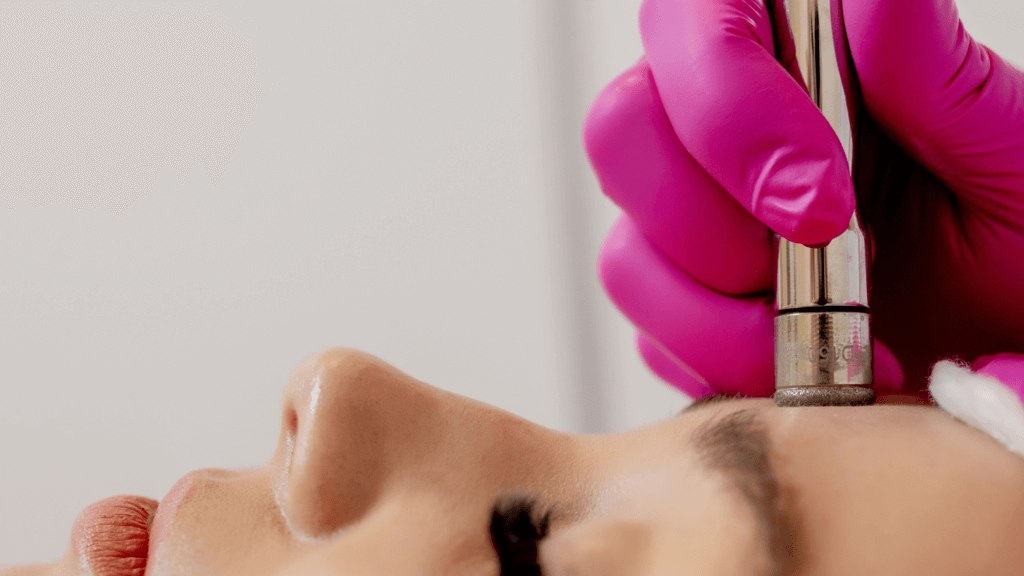
Microdermabrasion treatment close up
During a microdermabrasion treatment, the device is moved over the skin’s surface, creating a vacuum-like effect that removes dead skin cells and promotes skin renewal. This process helps to stimulate collagen production, which can help to fill in depressions and improve the skin’s texture. Additionally, microdermabrasion can help to reduce the appearance of fine lines, wrinkles, and hyperpigmentation as well.
The procedure is generally well-tolerated, and most patients report only a mild sensation during the treatment. After the procedure, clients may experience some mild redness or sensitivity, which typically subsides within a few hours.
If your acne scars are bothering you and you need any help and advice on personalised treatments, have a look at our facial treatments menu and talk to our Dermatologica-certified skin therapist Luwam. She’ll be pleased to help you start and accompany you on your journey to be more at peace with yourself when you look at your skin.
And do watch Skin Decision: Before and After on Netflix. The first episode about Sanaz also showcases Katrina’s story who began healing from a shocking tragedy by erasing the reminders on her skin. The episode entitled Fixing My Face features college-bound Trevor who contends with chronic acne. Truly inspiring stories and transformations.
Or are you one of those wonderful human beings who’re ready to embrace their skin as it is? We applaud you, and celebrate you! Read this inspiring Refinery29 article on 5 people who say their skin condition will never define who they are. Jade McDonnough, Leo Xander Foo, Cherry Jaymes, Clarissa Vargas, Naomi Hadar – you’re amazing!
Love,
Figaro London 💚

